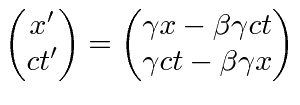Next: A Boost in an Up: ``Rotations'' in 4 Dimensions Previous: ``Rotations'' in 4 Dimensions Contents
Often physicists use
![]() as the time component of the 4-vector to make the minus sign in the dot product automatic.
as the time component of the 4-vector to make the minus sign in the dot product automatic.

 |
 |
||
 |
||
 |
||
 |
||
 |
||
 |
||
 |
The use of
![]() is quite convenient for calculations on Special Relativity but is frowned upon because
General Relativity requires further extensions of geometry for which the fully real version is preferred.
is quite convenient for calculations on Special Relativity but is frowned upon because
General Relativity requires further extensions of geometry for which the fully real version is preferred.
Jim Branson 2012-10-21